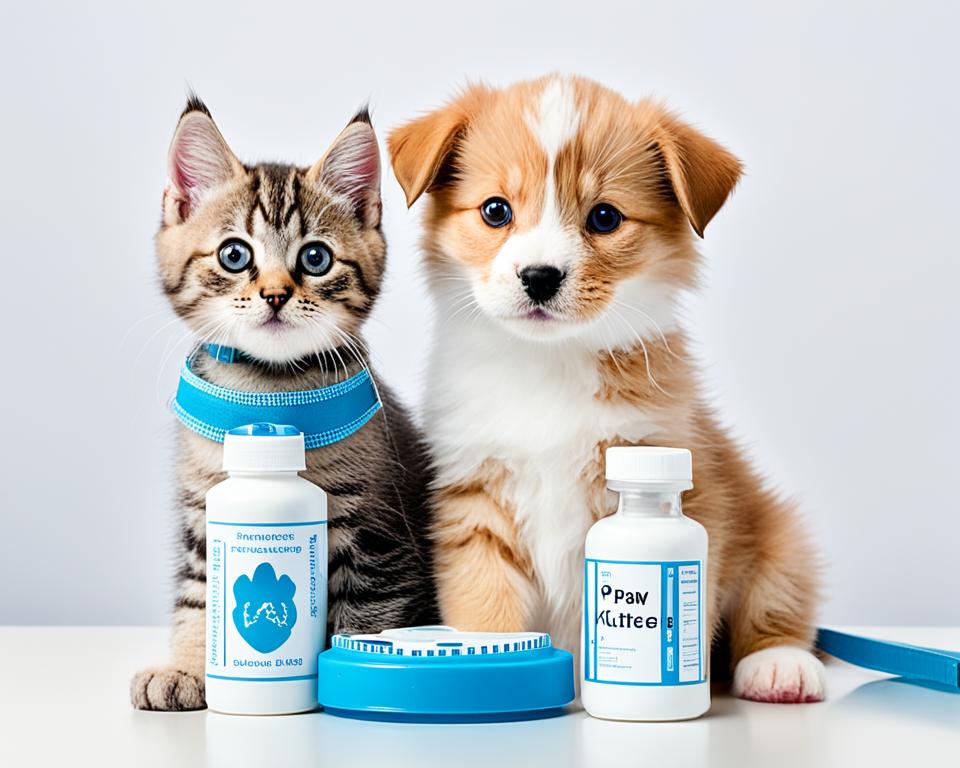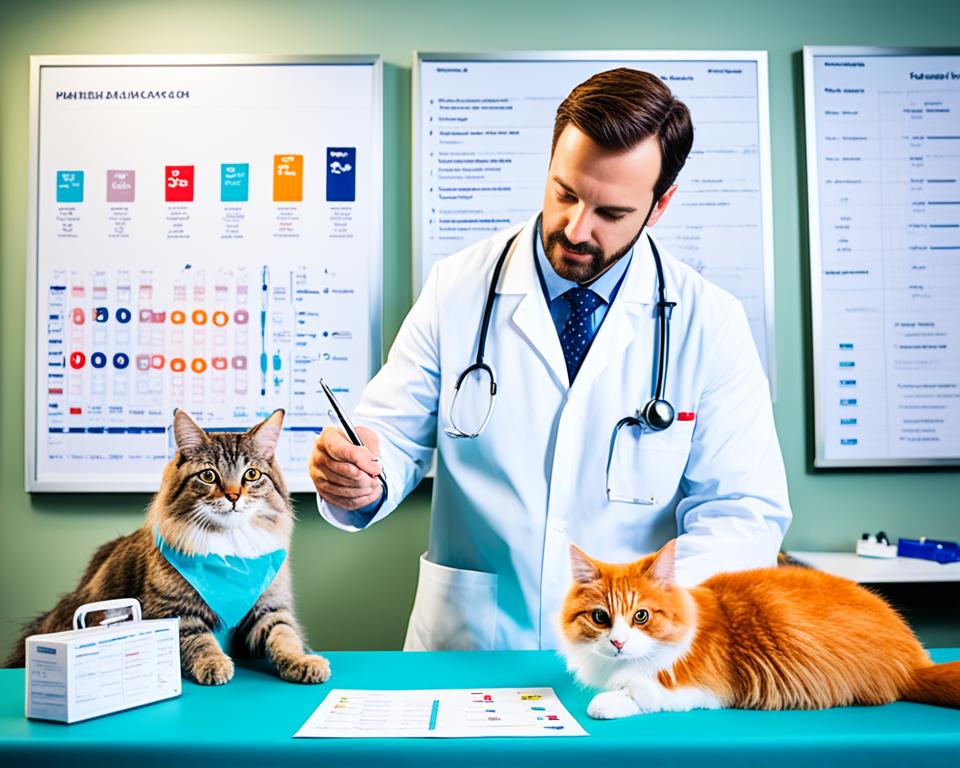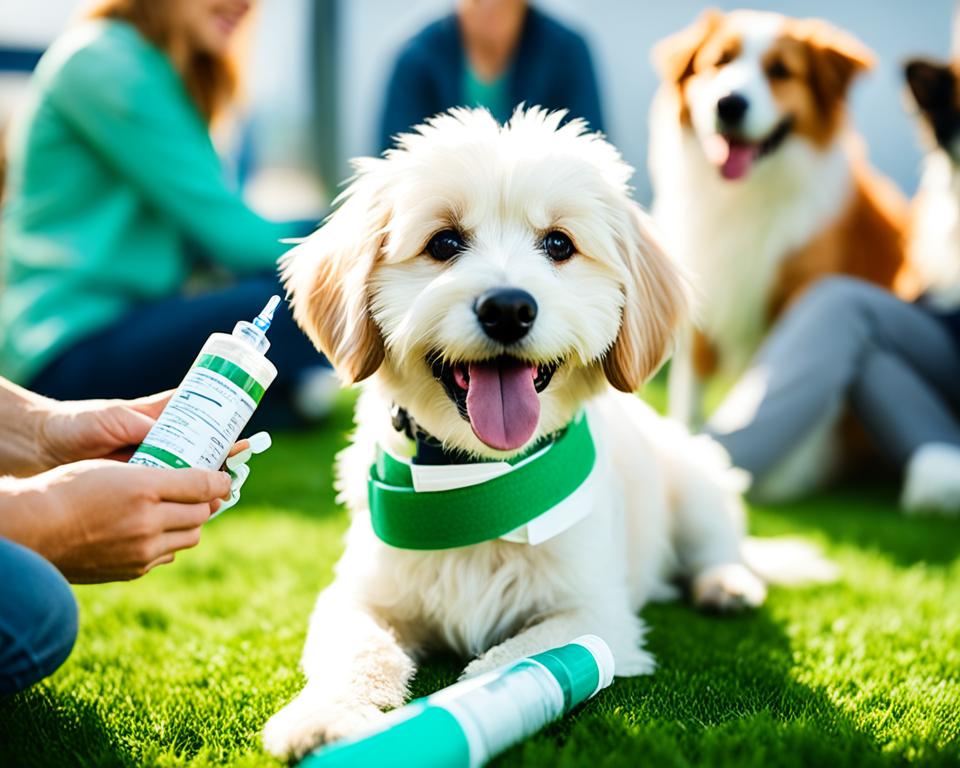As a pet owner, I know keeping our furry friends healthy is key. Vaccines are a must for preventive care. They protect our pets from serious diseases and boost their immune system. Vaccines also stop illnesses from spreading in pet groups.
Did you know August is National Immunization Awareness Month? It’s a great time to talk about pet vaccines. Many vaccines are needed by law in some places. Keeping up with vaccines saves us from expensive treatments for preventable diseases.
Vaccines protect against rabies, distemper, parvovirus, and feline leukemia. These shots keep our pets safe from serious illnesses. Regular check-ups and vaccines keep our pets happy and healthy. Let’s see why these small shots are so important for our pets.
Understanding the Importance of Pet Vaccinations
Pet immunizations are key for our furry friends’ health. They keep pets safe from deadly diseases. This helps our pets and our communities stay healthy.
Disease Prevention for Individual Pets
Prevention is the first step in pet healthcare. Vaccines protect pets from serious illnesses like parvovirus and rabies. These diseases can be very harmful but are mostly preventable.
As a pet owner, I’ve seen how vaccines keep my pets healthy. They stay active and happy.
Community Protection and Herd Immunity
Vaccinating our pets helps protect our communities too. This is called herd immunity. By keeping pets up-to-date, we stop diseases from spreading.
This is a big responsibility for pet owners. We all play a part in keeping our communities safe.
Cost-Effective Preventive Care
Veterinary shots are a smart choice for your pet’s health. They’re cheaper than treating serious illnesses. Many pet services also require proof of vaccination.
By keeping shots current, you save money and avoid stress. It’s a win-win for you and your pet.
| Benefit | Impact |
|---|---|
| Disease Prevention | Protects against deadly illnesses |
| Community Health | Reduces disease spread |
| Cost Savings | Prevents expensive treatments |
Regular check-ups and vaccinations are crucial for your pet’s health. Talk to your vet about a vaccination plan for your pet. This small step makes a big difference for your pet and our community.
Core Vaccines vs. Lifestyle Vaccines
Understanding the difference between core and lifestyle vaccines is key for pets. Core vaccines protect against serious diseases and are needed for all pets. Dogs need vaccines for rabies, distemper, parvovirus, and adenovirus. Cats need vaccines for rabies, viral rhinotracheitis, calicivirus, and panleukopenia.
Lifestyle vaccines are for pets at higher risk. For example, dogs that go to daycare need the Bordetella vaccine. Cats that go outside or live with other cats should get the feline leukemia virus (FeLV) vaccine.
Here are some important points:
- Canine core vaccines, like DAPP, are given in a series of 3-4 shots for puppies, then annually, and every 3 years for adults.
- Rabies vaccines are legally required for dogs and cats in most areas, including San Mateo County.
- For cats, the FVRCP vaccine covers core diseases and is administered 3-4 times for kittens, then yearly, followed by tri-annual boosters.
Your vet is the best person to talk to about vaccines. They’ll look at your pet’s age, health, and lifestyle to pick the right vaccines. Always talk to them to make sure your pet is protected.
Rabies Vaccination: A Legal Requirement and Life-Saver
Rabies vaccination is key for pets and keeps us safe. As a pet owner, I’ve seen it’s not just a good idea, it’s the law in most of the U.S.
Why Rabies Vaccines Are Mandatory
Rabies vaccines stop a deadly disease that can spread to people. Every year, around 5,000 animals in the U.S. get rabies, mostly wild ones. Vaccinating pets helps stop this virus.
These vaccines work well. They keep almost 300 dogs from getting rabies each year. This saves over 100 human lives and $3 million in medical costs. Yet, 53% of dog owners doubt the vaccine’s safety or usefulness.
Rabies Vaccination Schedule for Dogs and Cats
Dogs usually get their first rabies shot at 4 months old. Then, they need a booster shot a year later, and every three years after that. Cats have a similar schedule. Keeping track of these shots is important for things like traveling or boarding.
A rabies shot costs between $30 to $50, but many places offer cheaper options. Knowing your pet is safe from rabies gives you peace of mind. Keeping dogs vaccinated at 70% or higher helps stop rabies outbreaks.
Pet Vaccinations: Tailored Approaches for Dogs and Cats
Canine and feline vaccinations are quite different. Vets make special plans for each pet. They look at age, lifestyle, and local disease risks. This way, pets get the best protection.
Dogs usually get shots for distemper, parvovirus, and hepatitis. Cats need vaccines for feline leukemia, calicivirus, and panleukopenia. The first guidelines for these vaccines came out in 2007 and were updated in 2010. This set the stage for today’s pet healthcare.

| Dogs | Cats |
|---|---|
| Canine Distemper Virus (CDV) | Feline Parvovirus (FPV) |
| Canine Adenovirus (CAV) | Feline Calicivirus (FCV) |
| Canine Parvovirus Type 2 (CPV-2) | Feline Herpesvirus-1 (FHV-1) |
| Rabies (in endemic areas) | Rabies (in endemic areas) |
Now, vets focus on regular health checks, not just yearly shots. This means pets get vaccines based on their own needs. It’s amazing how pet care has changed to focus on what each pet really needs.
Puppy and Kitten Vaccination Schedules
As a pet owner, I know how important pet wellness programs are for our furry friends. Following the right vaccine schedule is a key part of these programs. Let’s look at the first vaccines and booster shots for puppies and kittens.
Initial Vaccine Series for Young Pets
Puppies and kittens start getting vaccines at 6-8 weeks old. They get several doses of core vaccines, spread out over weeks. This helps build strong immunity in our young pets.
- Puppies get shots for distemper, parvovirus, and hepatitis
- Kittens get shots against feline viral rhinotracheitis, calicivirus, and panleukopenia
Booster Shots and Their Timing
After the first series, booster shots keep our pets protected. The timing depends on the vaccine and the pet’s needs. Here’s a guide for some common vaccines:
| Vaccine | Initial Series | Booster Timing |
|---|---|---|
| Rabies (Dogs/Cats) | Single dose at 16 weeks | Annually or every 3 years |
| Distemper (Dogs) | 3 doses between 6-16 weeks | Every 3 years |
| FVRCP (Cats) | Every 3-4 weeks until 16-20 weeks | Every 3 years |
| Bordetella (Dogs) | 2 doses a year apart | Annually or semi-annually |
These schedules might change based on your pet’s needs and local disease risks. Always talk to your vet to make the best vaccine schedule for your pet.
Adult Pet Vaccination Guidelines
As a pet owner, I know keeping our furry friends healthy is key. Adult pet vaccinations are crucial for their health. They shield our pets from serious diseases and keep them healthy for a long time.
Adult dogs need the core DHPP vaccine every three years. This vaccine covers distemper, hepatitis, parvovirus, and parainfluenza. Dogs must get Rabies shots every three years after the first year.

Other vaccines depend on your pet’s lifestyle and risks. Dogs that go to kennels or dog parks might need the Bordetella vaccine every six months. Dogs at high risk might get Leptospirosis and Lyme disease vaccines every year.
“Preventive pet care, including regular vaccinations, is crucial for maintaining your pet’s health and preventing costly treatments down the road.”
Here’s a quick guide to common adult dog vaccines:
| Vaccine | Frequency | Protection |
|---|---|---|
| DHPP | Every 3 years | Distemper, Hepatitis, Parvovirus, Parainfluenza |
| Rabies | Every 3 years | Rabies |
| Leptospirosis | Annually | Leptospirosis |
| Bordetella | Every 6 months | Kennel Cough |
These are general guidelines. Your vet can make a plan just for your pet. Regular check-ups help keep your pet’s vaccinations up to date and healthy.
Potential Side Effects and Risks of Vaccinations
Pet healthcare is key for our furry friends. Vaccines are safe but can have side effects. I’ll cover common reactions, rare issues, and when to get vet help.
Common Mild Reactions
Most pets do well with vaccines, but some might feel a bit off. These reactions are usually gone in a day or two:
- Lethargy or decreased activity
- Low-grade fever
- Soreness at the injection site
- Loss of appetite
- Slight swelling or redness
Rare but Serious Adverse Effects
Some pets might have serious reactions, but it’s rare. About 1-10 cats and 13 dogs in 10,000 might have severe side effects. These can include:
- Difficulty breathing
- Facial swelling
- Persistent vomiting or diarrhea
- Collapse or fainting
- Hives or severe itching
When to Contact Your Veterinarian
Call your vet right away if you see these symptoms:
- Symptoms lasting more than 48 hours
- Signs of an allergic reaction (facial swelling, hives, difficulty breathing)
- Persistent vomiting or diarrhea
- Unusual behavior or severe lethargy
The benefits of vaccines for pets are usually more important than the risks. Keep an eye on your pet after shots and call your vet if you have health concerns.
| Reaction Type | Frequency | Onset Time |
|---|---|---|
| Mild reactions | Common | Within 24 hours |
| Severe reactions | Rare (1-13 per 10,000) | Minutes to 48 hours |
| Injection site nodule | Occasional | Within 14 days |
The Role of Annual Check-ups in Vaccination Maintenance

Annual check-ups are super important for our pets. They are key to keeping pets healthy. Vets do more than just give shots during these visits. They check your pet’s health, update shots, and talk about any changes that might affect their health.
Regular check-ups help find health problems early. This can save you money and help your pet. For example, adult pets need yearly exams. Senior pets might need check-ups every six months to catch age-related issues.
Here’s what happens during an annual check-up:
- Weight check and physical examination
- Review of medical history
- Update core vaccines (like rabies and FVRCP for cats)
- Blood, urine, or fecal tests as needed
- Discussion about preventive care, including heartworm medication
Missing these yearly visits can lead to health problems. Treating diseases early is better and cheaper. Your vet can also talk about dental care, which is key for your pet’s health.
“Regular veterinary checkups provide monitoring of a pet’s health, leading to appropriate recommendations and care plans for optimal health.”
By focusing on these annual check-ups, you’re doing more than keeping shots up to date. You’re investing in a full wellness program for your pet. This ensures your furry friend stays happy and healthy for years.
Affordable Pet Vaccination Options and Resources
Pet vaccinations are key to keeping our pets healthy. I’m excited to share some affordable options for pet shots in the Bay Area. Paw Fund has free pet vaccine clinics every month in Alameda and Contra Costa counties. These clinics help low-income or homeless pet owners who can’t afford regular vet care.
PALS East Bay also offers free basic vaccines and microchips every month to pet owners in the East Bay. In Contra Costa County, the Furry Friends Food Relief Program helps with low-cost vaccines and spay/neuter services. Many organizations, like the East Bay SPCA, list their vaccination prices and appointment info online for budget-friendly vet care.
Pet Food Express VIP Pet Care Clinic is another great choice. They give out vaccines, tests, and microchips at their stores across the Bay Area on certain dates. PetVet Clinic also offers vaccines and low-cost exams. They don’t charge an exam fee for medications and vaccines in most cases. Keeping your pet vaccinated doesn’t have to be expensive!

